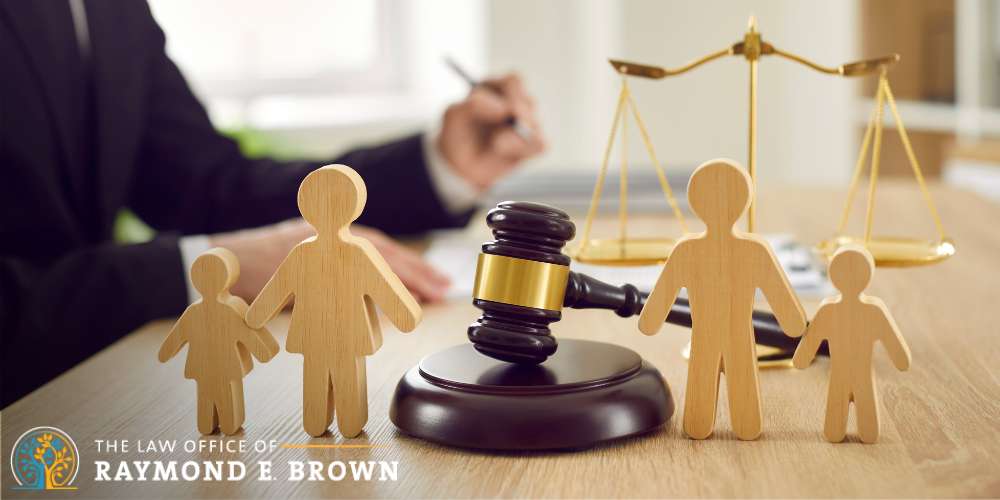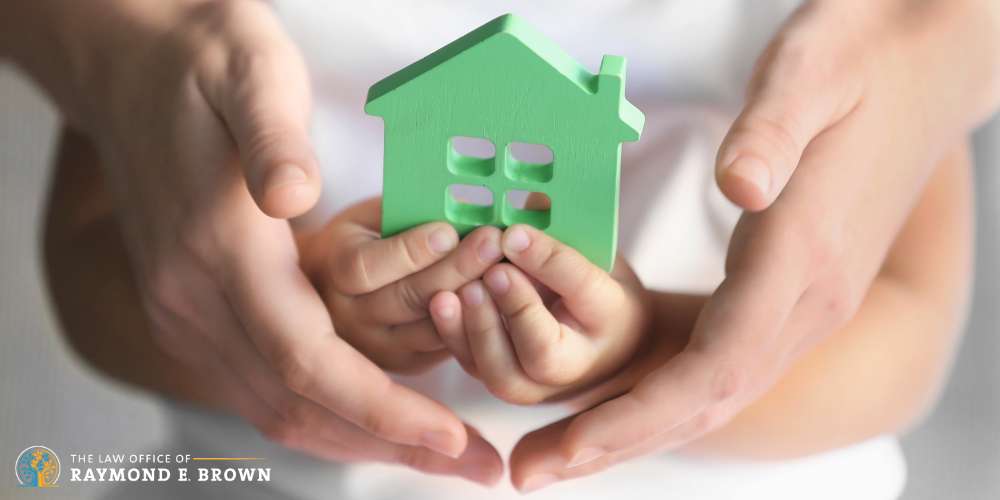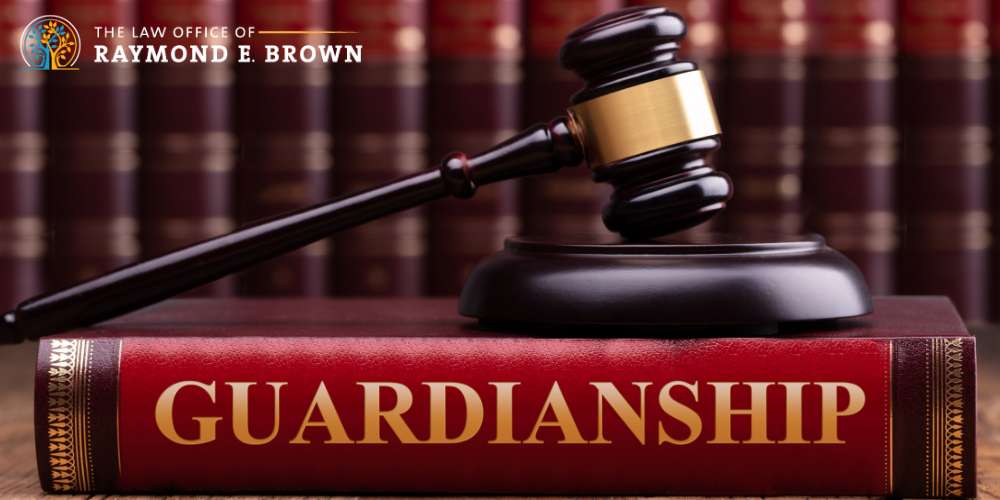Navigating legal custody and guardianship can be a complex and often challenging task for many families, even though the two legal processes are quite different from one another. Understanding the differences between custody and legal guardianship is crucial, as both terms carry significant implications for legal responsibility, legal rights, and the well-being of those involved.
As such, it’s important to have clear, professional guidance to ensure that all legal rights are protected and responsibilities are clearly defined. Raymond E. Brown, a dedicated Maryland guardianship attorney, stands ready to offer knowledgeable advice and representation.
Below, we’ll cover the distinctions between guardianship and custody, offering clarity and guidance to families making important decisions about the future and wellbeing of their loved ones.

Is Guardianship and Custody the Same Thing?
Guardianship and custody are not the same thing.
Custody refers to the rights and responsibilities that a child’s parents or guardians have, typically involving decisions about where the child lives, their education, health care, and overall upbringing. Custody of a child often implies that the parents are directly involved in the day-to-day parenting duties. A family law attorney can provide legal assistance on matters concerning child custody.
On the other hand, guardianship may be established in situations where an individual cannot make decisions for themselves due to a variety of different reasons. Typically, the services of an estate planning lawyer are needed to establish legal guardianship.
While guardianship and custody can both involve the care and decision-making responsibilities for a child or minor, guardianship can extend to adults, as well.
What’s the Difference Between Guardianship and Custody?
The key difference between guardianship and custody lies in the legal definitions and frameworks that govern each arrangement.
Child custody refers to the legal decision-making authority and physical care granted to a child’s parents, often in divorce or separation. Arrangements can be temporary or more permanent, depending on court decisions, and often involve significant court involvement and oversight.
In contrast, guardianship provides legal authority to an individual, who may or may not be the parents, to make decisions on behalf of a child or adult. This arrangement can be more flexible in terms of duration and permanence but still requires court approval.

Legal Guardianship in Maryland
Guardianship in Maryland refers to a legal relationship established when a court grants an individual the authority to make decisions for and take care of an individual who cannot make decisions for themselves, typically due to incapacity, disability, or the fact that they are a minor (under the age of 18).
This court-appointed role encompasses a wide range of legal responsibilities, including but not limited to managing financial obligations, making healthcare decisions, and ensuring the overall well-being of the child or incapacitated individual, also known as the “ward.”
Legal guardianship is a significant commitment, as it entrusts the guardian with substantial control over various aspects of the ward’s life, from education to healthcare to financial management and beyond.
Becoming a legal guardian involves petitioning the court, undergoing a thorough assessment to determine the suitability of the guardian, and ensuring that the proposed guardianship arrangement aligns with the ward’s well-being. The process is designed to protect those who cannot protect themselves, ensuring they receive proper care and that their affairs are handled responsibly.
Types of Guardianships
It’s important for those looking to establish guardianship to know the difference between the different types of guardianship in Maryland. There is temporary and permanent guardianship, which refers to the length of time a person is able to act as a guardian, as well as guardianship over the person and the property, which refers to the types of decisions a guardian is able to make on behalf of the ward.
Temporary Guardianship
Temporary guardianship in Maryland, often referred to as “emergency guardianship,” provides immediate protection and decision-making authority for the ward when there is an urgent need for someone to act on their behalf. This type of guardianship is typically sought when immediate action is necessary to prevent harm to the individual or to their property, and the situation cannot wait for the full guardianship process to be completed.
Permanent Guardianship
Unlike temporary guardianship, which is designed to address immediate and short-term needs, the court may grant permanent guardianship to provide long-term protection and decision-making support for the ward. A permanent guardian may be granted broad powers to make a wide range of decisions, including those involving healthcare, living arrangements, education, and financial matters, depending on the needs of the ward and the specific terms of the guardianship order.
Guardianship of the Person
This type of guardianship grants the guardian the authority to make personal, healthcare, and welfare decisions on behalf of the ward. It is appropriate when the ward is unable to make informed decisions about their own care due to reasons such as incapacity, disability, or being a minor in some cases. Decisions under this type of guardianship may include medical treatments, living arrangements, and educational matters.
Guardianship of the Property
Also known as “guardianship of the estate,” this is established to allow the guardian to manage and make decisions regarding the ward’s financial affairs and property. This form of guardianship is necessary when the ward is incapable of managing their own financial matters due to incapacity or disability. The guardian of the property is responsible for managing assets, paying bills, and handling any other financial transactions to benefit the ward.
Responsibilities and Duties of a Legal Guardian
In Maryland, a legal guardian holds a position of trust and responsibility, tasked with caring for the well-being of a ward, who may be either a minor or an incapacitated/disabled adult. The specific duties and extent of authority of a guardian can vary depending on the terms of the order and the needs of the ward, but some of the most common responsibilities include:
- Ensuring Appropriate Medical Care: Making decisions regarding the ward’s health care needs, including consenting to or refusing medical treatment on behalf of the ward. This involves staying informed about the ward’s medical condition and ensuring they receive appropriate and necessary medical care.
- Overseeing Education and Training: Ensuring the ward has access to appropriate educational opportunities. For minors or those under guardianship who are capable of schooling, this includes decisions about school enrollment, special education services if needed, and supporting their educational progress.
- Making Living Arrangements: Deciding on the most suitable living arrangements for the ward, which may involve choosing a residence that meets their health, safety, and welfare needs. This can also include making arrangements for in-home care, or placement in a facility that can provide the level of care required.
- Managing Assets and Income: For guardians appointed over property, responsibilities include managing the ward’s financial affairs. This involves safeguarding assets, investing funds prudently, paying bills, and managing any income, pensions, or benefits the ward receives. More specifically, this may include paying rent or mortgage, utilities, insurance premiums, and any other financial oligations necessary for the ward’s well-being and quality of life.
- Abiding by Legal Duties: Complying with all legal requirements associated with guardianship, including filing annual reports or other documents as required by the court, detailing the ward’s condition, the care provided, and an accounting of the ward’s finances.
- Acting in the Ward’s Best Interests: Acting in the best interests of the ward at all times, making decisions that enhance their quality of life, protect their rights, and ensure their needs are met.

Legal Custody in Maryland
Child custody is the legal right and responsibility granted to an adult to care for and make decisions on behalf of a child, often formalized through a custody agreement.
This encompasses the physical custody of a child, determining where the child will live, and legal custody, which involves making critical decisions about the child’s welfare, including education, health care, and religious upbringing.
When parents separate or divorce, they may reach a custody agreement that outlines the specifics of child custody, including a parenting schedule and how decisions are made. In some cases, one parent may be granted full custody, while in others, both parents share these responsibilities, always with the minor children’s best interests as the guiding principle.
This legal framework ensures that despite the changes in the parental relationship, the child’s needs and welfare remain a priority, with clear expectations set for each parent’s role in the child’s life.
Types of Custody
In Maryland, custody is categorized into different types, reflecting the legal and practical arrangements for the care and decision-making of a child. This includes physical custody (including joint and sole physical custody) and legal custody (including joint and sole legal custody).
Physical Custody
Physical custody refers to the physical living arrangements for a child. This type of custody can be sole, meaning the child lives with one parent full-time, or joint, meaning a partial physical custody arrangement where the child’s time is divided between both parents’ homes.
Legal Custody
Legal custody refers to the authority to make significant decisions regarding the child’s, wellbeing, including education, medical care, and religious upbringing. This can also be joint, where parents share custody and decision-making responsibilities, or sole, granting one parent full decision-making custody.
Role of a Custodian
The role of a custodian, often designated in child custody arrangements, involves stepping into a position of care and responsibility for minor children. One parent or an appointed legal resident who takes on physical custody may assume this role, meaning they provide a home and meet the child’s day-to-day needs.
As custodians, they assume parenting duties, making decisions that positively impact the child’s safety and upbringing. The establishment of such legal relationships is critical, especially in scenarios where the safety of the child is at stake due to the absence or incapacity of the child’s biological parents.

Does Guardianship Override Custody?
In Maryland, when a court appoints a guardian, this status does allow the guardian to make significant legal decisions on behalf of the ward, potentially impacting the dynamics of existing custody arrangements. However, the appointment of a child’s guardian to oversee their care and make legal decisions does not inherently override parental custody rights unless the court explicitly alters or terminates those rights.
When to Choose Guardianship vs. When to Pursue Custody
Deciding between child custody and legal guardianship hinges on the circumstances surrounding the child’s safety and the capability of the child’s parent to provide care.
Guardianship is often the preferred legal agreement in situations where parental incapacity or absence is evident, such as in cases where a child’s parent cannot fulfill their role due to mental health issues, felony convictions, or when they are not of sound mind.
Additionally, guardianship is sought for providing stability and support for a child in need, particularly for minors with special needs requiring tailored care beyond what the biological parent can offer. This arrangement ensures that the child’s needs for education, including consistent school attendance, and overall well-being are met by someone capable of making informed decisions on their behalf.
On the other hand, pursuing custody is more appropriate in scenarios like divorce or separation of parents, where maintaining a stable parent-child relationship and ensuring the child’s safety and well-being are paramount. Custody battles often arise in the context of disputes over parental rights and responsibilities, especially in contentious family situations that might involve domestic violence. In such cases, custody decisions aim to protect the child’s interests, ensuring they are placed with the parent best suited to provide a nurturing environment.
Custody is also a significant consideration among unmarried parents seeking to establish a formal structure around their child’s upbringing, highlighting the importance of legal frameworks in protecting the dynamics of the parent-child relationship.

How an Attorney Can Help With Custody and Legal Guardianship
An experienced estate planning attorney in Maryland can offer indispensable support to those looking to secure the future of a child or dependent adult. For those considering guardianship, an attorney like Raymond E. Brown can provide experienced guidance on the necessary decisions regarding legal guardianship and conservatorship, ensuring the ward’s well-being and financial needs are met through comprehensive estate planning.
Individuals seeking to handle matters involving child custody or child support would benefit from consulting a family law attorney.
In Maryland, the distinction between child custody and legal guardianship is significant, and having the right legal support can make all the difference in achieving a favorable outcome.
Seeking Guardianship in Maryland? Call the Estate Planning Lawyers at The Law Office of Raymond E. Brown Today
Ready to explore guardianship options in Maryland? Reach out to The Law Office of Raymond E. Brown to get connected with an experienced Annapolis estate planning attorney who can guide you through the legal process. Call (443) 554-9944 or complete our online contact form to schedule a consultation today.

